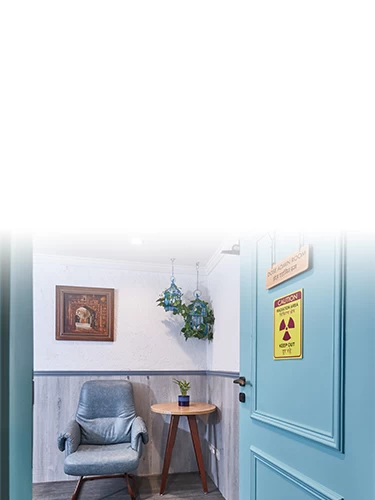About LU-177 PSMA Therapy

After the Treatment
- After the therapy, most patients can return home within few hours
- Avoid any strenuous activities for 24 hours after the treatment.
- It would help if you avoided close contact with other people for 24 hours after the injection.
- Blood tests will be done 2 weeks to 6 weeks after the treatment.
- After getting discharged from the hospital, you need to avoid close contact with young children and pregnant women.
- Avoid sharing your bed with another person for at least 3 days.
Lu-177 PSMA Therapy Can't Be Applied When
- There is an obstruction and enlargement in the urinary tract
- The total white cell count is less than <2.5×109 /L
- The platelet count is less than <75×109 /L
- There is any liver and kidney disease and infections
(a) Baseline (b) follow-up after 2 cycles (c) after 4 cycles
(d) after 6 cycles [68GalGa-PSMA PET/CT of a patient with mCRPC, who was treated with Lu-PSMA Therapy.
What is Lu-177 PSMA Therapy?
Lu-177 PSMA Therapy is also known as Prostate-Specific Membrane Antigen Therapy. It is an innovative treatment that is used to treat advanced prostate cancer. This treatment is effective and successfully reduces the tumor's size and prevents the tumor from multiplication.
This therapy is used with the recommendation of the referring physician when other treatments are insufficient or become ineffective for patients. It has been shown that long-term improvement can be achieved with this therapy in many advanced prostate cancer patients.
How does Lu-177 PSMA Work?
PSMA therapy uses two drugs:
- PSMA-617 which attaches itself to PSMA on cancer cells.
- Radioactive Lutetium 177 which binds itself to PSMA-617 which then carries it into the tumor.
When Lu-177 PSMA is administered intravenously into the body, it travels throughout the bloodstream. reaches the cancer cells. and destroys or damages them by emitting radiation.
This therapy only targets the cancer tissue, and the radiation doesn't affect the other parts of the body. The remaining part of Lu-177 PSMA is not held by tumor cells but excreted from the body by saliva, urine, and feces.
Who is the Suitable Candidate for Lu-177 PSMA Therapy?
PSMA therapy is used on men with metastasized prostate cancer or who have tried hormone treatments and chemotherapy. It is one of the most effective therapies for managing metastatic prostate cancer after other types of treatments have failed. PSMA therapy may be an option when other treatments don't slow cancer spread.
The following criteria are required to be a suitable candidate for Lu-177 PSMA Therapy:
- The patient should be 18 years or older.
- The patient has advanced prostate cancer.
- The patient is not getting any benefits from other medical treatments.
- The patient does not have any serious conditions such as liver or kidney failure.
Is this Therapy Safe?
It is a completely safe treatment because the radiation used in Lu-177 is designed only to destroy the cancer cells, and the whole body is never exposed to the radiation. With theranostic, the treatment becomes more personalized and precise. The radiation will only destroy the cancer cells, and the healthy cells remain untouched.
After the therapy, blood tests will be performed to make sure that the radiation is not damaging the healthy cells. With the help of imaging tests, it is also determined that the radioactive material at the tumor sites has been absorbed correctly.
Benefits of Lu-177 PSMA Therapy Over Other Treatments
Lu-177 PSMA Therapy has numerous benefits compared to external beam radiation and chemotherapy:
- It can be effectively considered when other treatments failed.
- Itwon't show any negative effect on the central nervous system because it doesn't cross the blood-brain barrier.
- No severe side effects are associated with this treatment.
- After starting this therapy, PSA levels tend to drop rapidly.
Side Effects of Lu-177 PSMA Therapy
As the treatment is directed toward the tumor, serious side effects are not usually seen in patients. Some side effects are:
- Dry mouth
- Dry eves
- Nausea
- Vomiting
- Tiredness
- Decrease in blood cells production
Before the Treatment
- Ensure that at least 4 weeks have passed since your last chemotherapy.
- Drink plenty of water for several days before the treatment.
- Avoid alcohol consumption and do not take aspirin and anticoagulants.
- It is important to use the medication prescribed by your physician.
- PSMA PET Scan is done to spot cancer outside the prostate, which helps to target the treatment.
- Complete blood count and other blood tests are also done. Bring comfortable and wide clothes with short sleeves for the treatment.
During the Treatment
- Lu-177 PSMA is administered through a vein placed on your arm.
- The drug will take around 30 minutes to infuse into the bloodstream.
- During and after the injection, you need to stay in the hospital for some time to ensure that the radiation level decreases.
- For patients who have urinary retention problems, urinary catheters are used.
- 2-6 total treatment cycles are applied at 6-8 weeks intervals.
- If needed, you will be given anti-nausea medications during or after the treatment.


